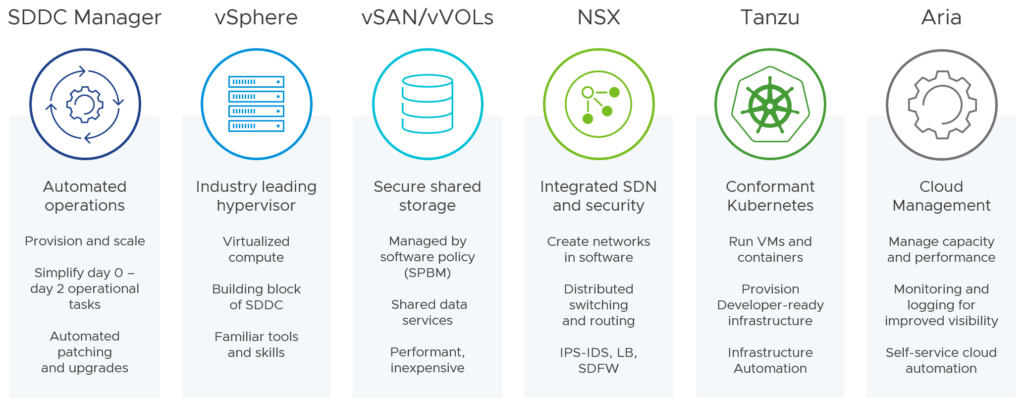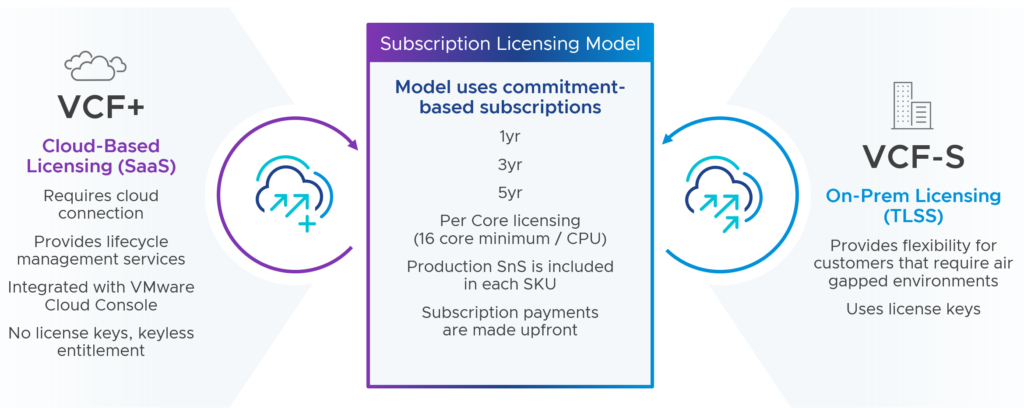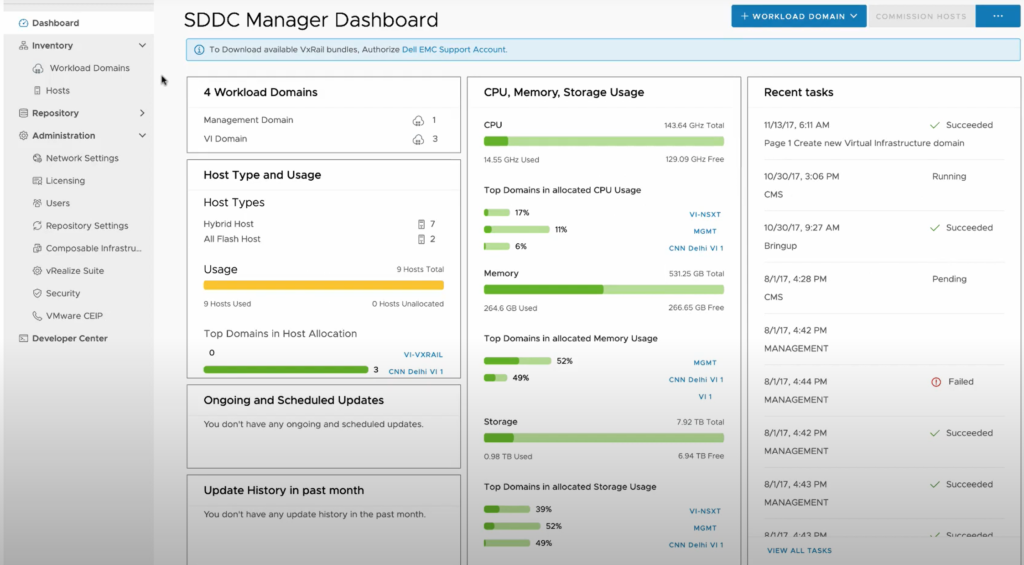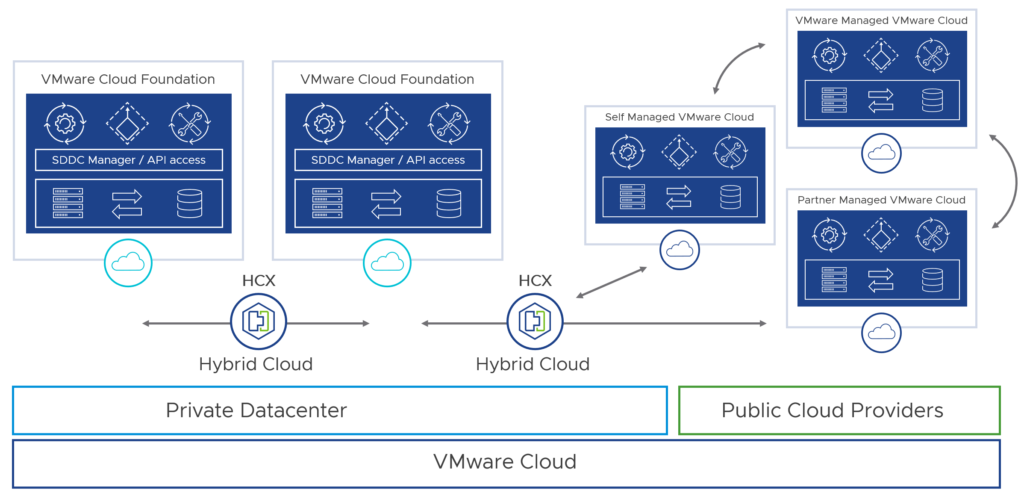 this version, which was based on VMware Cloud Foundation 4.3, and now covers all capabilities and enhancements that were delivered with VCF 4.5.
this version, which was based on VMware Cloud Foundation 4.3, and now covers all capabilities and enhancements that were delivered with VCF 4.5.
 this version, which was based on VMware Cloud Foundation 4.3, and now covers all capabilities and enhancements that were delivered with VCF 4.5.
this version, which was based on VMware Cloud Foundation 4.3, and now covers all capabilities and enhancements that were delivered with VCF 4.5.
What is VMware Cloud Foundation (VCF)?
VMware Cloud Foundation is a multi-cloud platform that provides a full-stack hyperconverged infrastructure (HCI) that is made for modernizing data centers and deploying modern container-based applications. VCF is based on different components like vSphere (compute), vSAN (storage), NSX (networking), and some parts of the Aria Suite (formerly vRealize Suite) . The idea of VCF follows a standardized, automated, and validated approach that simplifies the management of all the needed software-defined infrastructure resources.
This stack provides customers with consistent infrastructure and operations in a cloud operating model that can be deployed on-premises, at the edge, or in the public cloud.
Tanzu Standard Edition is included in VMware Cloud Foundation with Tanzu Standard, Advanced, and Enterprise editions.
Note: The VMware Cloud Foundation Starter, Standard, Advanced and Enterprise editions do NOT include Tanzu Standard.
What software is being delivered in VMware Cloud Foundation?
The BoM (bill of materials) is changing with each VCF release. With VCF 4.5 the following components and software versions are included:
Note: Only one vCenter Server license is required for all vCenter Servers deployed in a VMware Cloud Foundation system.

vSphere+ and vSAN+ . VCF+ delivers cloud connectivity to centralize management and a new consumption-based OPEX model to consume VMware Cloud services.

Note: In a given VCF+ instance, you can only have VCF+ licensing, you cannot mix VCF-S (term) and VCF perpetual licenses with VCF+.
What are other VCF subscription offerings?
VMware Cloud Foundation Subscription (VCF-S) is an on-premises (disconnected) term subscription offer that is available as a standalone VCF-S offer using physical core metrics and term subscription license keys.

VMware Cloud Universal program.
Note: You can mix VCF-S with perpetual license keys as long as you use the same key (either or) for a workload domain.
Which VMware Cloud Foundation editions are available?
A VCF comparison matrix can be found here .
VMware Cloud Foundation Architecture
VCF is made for greenfield deployments (brownfield not supported) and supports two different architecture models:

Note: If vSAN is used, VCF only supports a minimum of 3 nodes and a maximum of 4 nodes per VCF Remote Cluster. If NFS, vVOLs or Fiber Channel is used as principal storage, then VCF supports a minimum of 2 and a maximum of 4 nodes.
Important: Remote clusters and remote workload domains are not supported when VCF+ is enabled.
Does VCF support HCI Mesh?
Yes. VMware Cloud Foundation 4.2 and later supports sharing remote datastores with HCI Mesh for VI workload domains.
HCI Mesh is a software-based approach for disaggregation of compute and storage resources in vSAN. HCI Mesh brings together multiple independent vSAN clusters by enabling cross-cluster utilization of remote datastore capacity within vCenter Server. HCI Mesh enables you to efficiently utilize and consume data center resources, which provides simple storage management at scale.

VMware HCX provides a path to modernize from a legacy data center architecture by migrating to VMware Cloud Foundation.

NSX Advanced Load Balancer (NSX ALB) formerly known as Avi is a solution that provides advanced load balancing capabilities for VMware Cloud Foundation.
Which security add-ons are available with VMware Cloud Foundation?
VMware has different workload and network security offerings to complement VCF:
Can I get VCF as a managed service offering?
Can I install VCF in my home lab?
Yes, you can. With the VLC Lab Constructor , you can deploy an automated VCF instance in a nested configuration. There is also a Slack VLC community for support.

VMware Foundation 4.5 FAQ for more information about VMware Cloud Foundation.
| About the Author: Michael Rebmann works as a Lead Solution Architect for VMware Switzerland and focuses on some of the largest and most strategic customers. He is alao part of VMware's Office of the CTO Global Field and Industry team in the role of a CTO Ambassador. Michael shares his knowledge and opinion on his private blog cloud13.ch as well. |